| Linkker LM312 | |
|
Clik here to view.  |
|
| Manufacturer | Linkker; Gemilang Coachworks |
| Bodywork | Linkker LinkLight |
| Years in operation | 2021— |
| Operators | SBS Transit |
| Technical Data | |
| Length | 12 metre |
| Powertrain | Linkker LinkDrive |
| Accessibility | Low Floor |
| Emission Standard | Zero tailpipe emissions |
The Linkker LM312 is a fully electric, low-floor single-deck city bus offered by ST Engineering Land Systems, based on the Linkker 12 LF integral bus. Primary contractors include Finnish electric bus manufacturer Linkker for the electric drivetrain and bodywork (TBC), and Malaysian bodybuilder Gemilang Coachworks for the final assembly.
In a tender awarded to ST Engineering Land Systems, 20 units of these buses were procured by the Land Transport Authority in 2018 as part of efforts to build a more environmentally friendly public bus fleet. In total, 60 electric buses were procured from three separate manufacturers at a total sum of S$50.64 million.
These buses are also the first public buses in Singapore to be charged via overhead pantographs at bus interchanges. An autonomous variant of this bus is used for ST Engineering research and development, named the STROBO Series 12 Bus.
The first unit (SG3088R) was registered to SBS Transit on 13 July 2021. All Linkker LM312 buses will enter service by end-2021, as stated in an LTA press release in October 2020 (having been delayed from 2020).
Background
ST Engineering Background (Click to expand)
ST Engineering is a Singapore-based integrated engineering group dealing in the aerospace, electronics, land systems and marine sectors; primarily engaging in defence applications. The company’s Land Systems division (formerly ST Kinetics) is established in the local bus industry as the local distributor for MAN buses (MAN A22, MAN A24 and MAN A95), of which many entered service in Singapore since 2011.
The company has also produced a 3-door concept single-deck bus and a 3-door concept double-deck bus, both of which commenced revenue service trials in 2017, and had refitted an existing diesel bus to an electric bus as a proof-of-concept. ST Engineering also secured an LTA contract for 3-door Euro 6 double-deck buses and is working with LTA to develop and trial fully-autonomous buses in the future.
For the bus industry, ST Engineering typically works with different manufacturers for fabrication and systems development. It has marketed city buses on MAN and Linkker chassis (most frequently with Gemilang Coachworks bodywork) and used Yinlong and BYD vehicles as platforms for autonomous vehicle development. ST Engineering is also the Asia Pacific distributor for Linkker electric buses.
For the Linkker LM312, aluminium bodywork and electric drivetrain components are procured from Linkker, an electric bus manufacturer from Finland. Linkker had previously tested its buses domestically (in Helsinki, Espoo, Turku) and overseas in Copenhagen and Moscow. Electric motors and inverters are supplied by Danfoss, a Denmark-based engineering group.
These buses are based on the Linkker 12 LF low-floor city bus. Unlike Linkker 12/12+ units operating in Europe, local units bear a significantly different exterior bodywork design (likely commissioned by ST Engineering). One unit was built by Linkker; the remaining 19 units were shipped as completely-knocked-down (CKD) kits and assembled at Gemilang Coachworks in Malaysia. (TBC)
The unique bodywork design is characterized by asymmetric front and rear body panel designs. The bus also uses 19.5-inch diameter tyre rims, which are perceptibly smaller than the 22.5-inch tyre rims on most buses.
The STROBO Series 12 Bus Autonomous Electric Buses, also built by a partnership of ST Engineering/Linkker/Gemilang Coachworks, bears a similar bodywork design with additional roof attachments. Like the STROBO Series 12, these buses are OppCharge-compatible, fully-low-floor and equipped with three doors for more efficient passenger movement.
Find out more about Electric Buses in Singapore here.
Linkker LM312
Twenty units of the Linkker LM312 were produced.
According to an online report, Linkker reportedly built one completely-built-up (CBU) unit in Finland, and the remaining nineteen units were assembled by Gemilang Coachworks in Malaysia using completely-knocked-down (CKD) kits. All units are bodied with Linkker’s LinkLight aluminium bus body. The accuracy of this report cannot be ascertained; given the unnecessary nature of shipping CKD bus kits to Gemilang which also builds aluminium bus bodies.
A similar electric drivetrain was also fitted to the ST Engineering Retrofitted Electric Bus and the ST Engineering STROBO Series 12 autonomous bus.
Buses are registered from SG3070R to SG3089M. SG3088R is fitted with the Eco-Friendly Electric Bus wrap.
Image may be NSFW.Clik here to view.
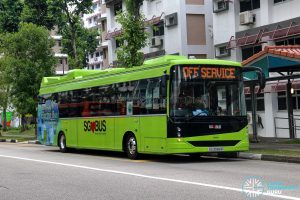 Image may be NSFW.
Image may be NSFW.Clik here to view.
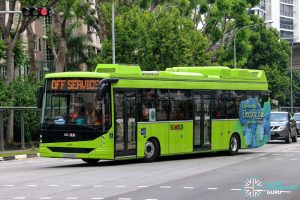 Image may be NSFW.
Image may be NSFW.Clik here to view.
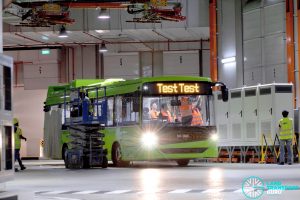 Image may be NSFW.
Image may be NSFW.Clik here to view.
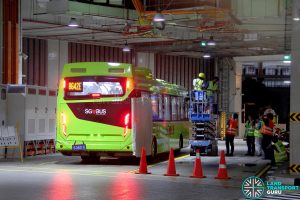
| Basic Technical Specifications | |
| Driveline | Linkker LinkDrive electric driveline |
| Electric Motor | Danfoss Editron EM-PMI375-T800-1600 Permanent Magnet assisted Synchronous Reluctance Motor (dual inverter) Continuous power/torque of 139 kW / 828 Nm Maximum power/torque of 231 kW / 2100 Nm |
| Battery | Lithium Iron Phosphate batteries (177.5 kWh) Opportunity charging via inverted pantograph (Oppcharge) with secondary CCS2 plug-in charging capability Up to 450 kW DC charging input |
| Bodywork | Linkker or Gemilang bodywork (TBC) Lightweight aluminium unibody construction; full-low-floor layout with 3 doors Assembled by Gemilang Coachworks in Malaysia |
| EDS | Luminator ULTIMA Electronic Display Sign (EDS) Orange LED Matrix design. Luminator Basic driver controller. |
| PIDS | Luminator INFOtainment Passenger Information Display System (PIDS) Interior-facing unit (29”) and exterior-facing unit (21.5”) Interior & Exterior Speakers |
| ADAS | ST Engineering DriveSafe Advanced Driver Assistance System (ADAS) |
| AFS | TNT Surveillance Anti-Fatigue system (AFS) (T-DA Driver Alert Camera) |
| Passenger Capacity | 28 Seated + 55 Standing = 83 Passengers 2 Wheelchair Bays |
| Other Specifications | Eberspächer Sütrak AC136 G4 AE electric air-conditioning system Masats door systems USB Charging Ports Vogel Industrie System 750/3 seats Rooftop charging rails for inverted pantograph charging (Oppcharge) Daytime Running Lights (some units only) |
It is noted that the retrofitted electric bus has opted for Lithium Iron Phosphate (LFP) batteries, which differ from two existing Lithium-ion battery options offered with Linkker buses (LTO and NMC batteries).
Omitting in-depth technical comparisons between the three, LFP batteries are relatively cheaper, less toxic, and typically last longer as compared to other forms of Lithium-ion batteries. LFP batteries have also been widely adopted for electric buses, with the world’s leading electric bus manufacturers by sales volume (Yutong, BYD and Zhongtong) opting for LFP batteries.
Two overhead pantograph chargers were also installed at Bukit Panjang Integrated Transport Hub and Bedok Integrated Transport Hub to support the daily operations of these buses.
See Also: ST Engineering STROBO Series 12 Bus – Autonomous Electric Bus
Fleet
The 20 Linkker LM312 buses are to be registered as SG3070R – SG3089M.
These buses are leased to the following operators:
- SBS Transit
SG3088R (Registered on 13 Jul 2021)
Opportunity charging
Based on the concept of Opportunity charging, the Linkker LM312 is charged at the terminus of a bus route, where charging points (typically overhead charging) are erected. The bus is sufficiently recharged in a short amount of time (usually several minutes) before the bus continues on its next trip.
Clik here to view.
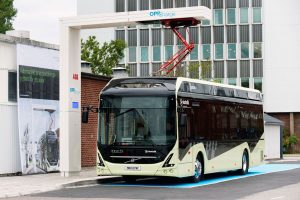
With fewer batteries required per bus, its advantages translate to a more spacious bus interior, lower environmental cost of battery production, and lower electricity consumption through reduced vehicle weight. Its disadvantages include the lack of deployment flexibility (on non-infrastructure-equipped routes) and the possible impact on bus operations should a charging station break down, and some redundancy is thus required, such as installing multiple chargers at terminating points.
Currently, efforts are focused on expanding the use of opportunity charging on suitable routes and the adoption of similar charging infrastructure between bus manufacturers, allowing multiple bus models to use the same charger.
The Opportunity Charging approach is favoured by European bus manufacturers. Conventional, depot-charged buses carry a large number of batteries on every bus to achieve sufficient operating range over a day’s worth of revenue service, and this is the approach preferred by Chinese bus manufacturers.
Overhead pantograph
The Linkker LM312 buses are charged via overheard pantograph, based on the opportunity charging (OppCharge) platform.
Clik here to view.
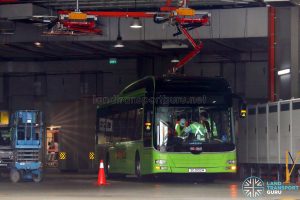
OppCharge is an open and competition-neutral interface seeking to accelerate the adoption of electric buses by being compatible with multiple bus manufacturers, hence offering operators choice and flexibility of buses without the need to modify existing charging infrastructure. These overhead pylon chargers with extendable pantographs are usually installed at the end stops of bus routes, allowing buses to quickly receive a full charge in-between trips.
Charging is fully automatic and secured by a two-way WiFi communication sequence. The driver gets a clear indication in order to stop within the specified ± 200 mm from the reference point. The charging sequence is started by activating the parking brake, and the driver can interrupt it at any time.
Swiss-Swedish engineering group ABB supplied four 450 kW chargers with installation, civil works, project management and commissioning. These chargers would allow the electric buses to be quickly recharged in less than ten minutes at key bus interchanges with an automated rooftop connection.
A similar overhead charger was installed at Cleantech Park in support of the NTU-LTA-Volvo Autonomous Bus Trial. The Volvo 7900 Electric bus participating in the trial is OppCharge-compatible and is recharged with the ABB HVC 300P fast-charge system, which delivers 300 kW DC power.
Image may be NSFW.Clik here to view.
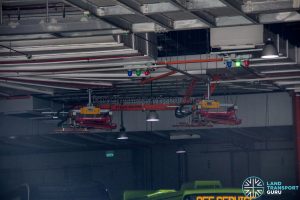 Image may be NSFW.
Image may be NSFW.Clik here to view.
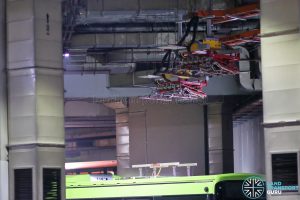 Image may be NSFW.
Image may be NSFW.Clik here to view.
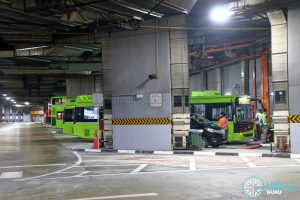 Image may be NSFW.
Image may be NSFW.Clik here to view.
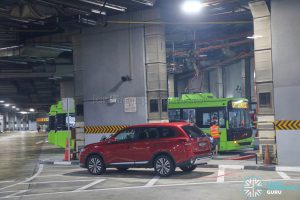
Two overhead pantograph chargers were each installed at Bukit Panjang Integrated Transport Hub and Bedok Integrated Transport Hub.
See also: Installation of overhead bus chargers at Bedok and Bukit Panjang
Gallery:
Image may be NSFW.Clik here to view.
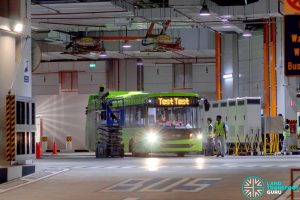 Image may be NSFW.
Image may be NSFW.Clik here to view.
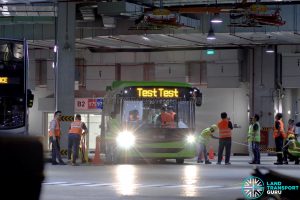 Image may be NSFW.
Image may be NSFW.Clik here to view.
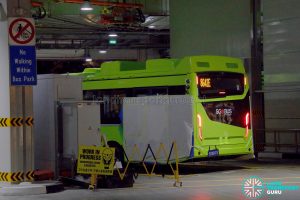 Image may be NSFW.
Image may be NSFW.Clik here to view.
 Image may be NSFW.
Image may be NSFW.Clik here to view.
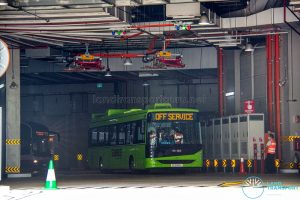 Image may be NSFW.
Image may be NSFW.Clik here to view.
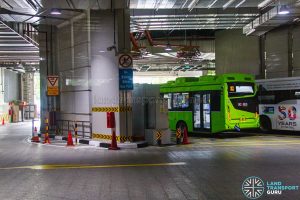 Image may be NSFW.
Image may be NSFW.Clik here to view.
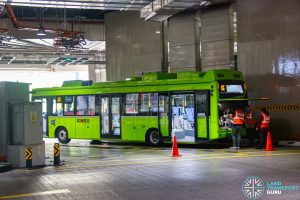 Image may be NSFW.
Image may be NSFW.Clik here to view.
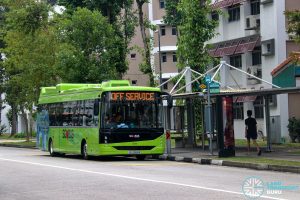 Image may be NSFW.
Image may be NSFW.Clik here to view.
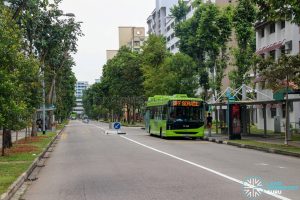 Image may be NSFW.
Image may be NSFW.Clik here to view.
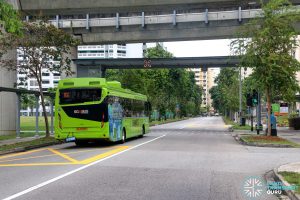 Image may be NSFW.
Image may be NSFW.Clik here to view.
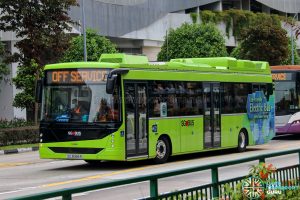 Image may be NSFW.
Image may be NSFW.Clik here to view.
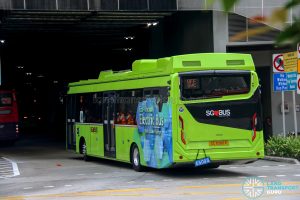 Image may be NSFW.
Image may be NSFW.Clik here to view.
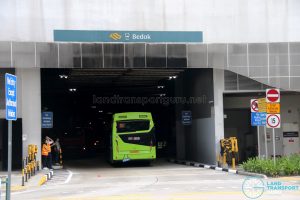
Annexe – ST Engineering Partnership
ST Engineering-Linkker Partnership (Click to expand)The partnership was indicated in ST Engineering’s 2017 Annual Report, referred to as a “partnership with an Original Equipment Manufacturer (OEM) for electric buses to distribute electric buses in right-hand drive countries in Asia Pacific, including Singapore, Australia, Hong Kong, Indonesia, Malaysia, New Zealand and Thailand”.
Image may be NSFW.Clik here to view.
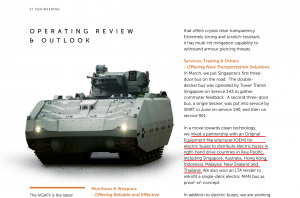 Image may be NSFW.
Image may be NSFW.Clik here to view.
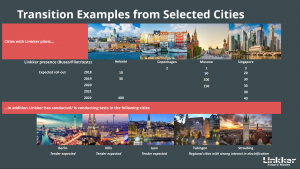 Image may be NSFW.
Image may be NSFW.Clik here to view.
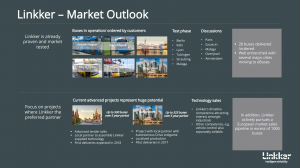
Annexe – Article titles
This article was initially titled ST Engineering Electric Bus, later changed to ST Engineering/Linkker Electric Bus upon knowledge of Linkker supplying ST Engineering with drivetrain components.
Updated title ST Engineering/Linkker Electric Bus (Linkker 12 LF) in reference to a Linkker presentation that referred to the bus’ autonomous variant as a Linkker 12 LF, featuring the same right-hand-drive, three-door, low-floor layout.
Updated title Linkker LM312 reflects the final model name that the bus is registered under, as confirmed via OneMotoring (13 July 2021).
ST Engineering-Linkker Projects:
- ST Engineering-Linkker Autonomous Electric Buses
- ST Engineering STROBO Series 12 Bus – Autonomous Electric Bus
- MAN A22 Electric Bus conversion project
- ST Engineering Retrofitted Electric Bus (MAN A22)
External Links & References:
- LTA Awards Contract for 60 Electric Buses to Three Tenderers – LTA [Accessed 6 Feb 2021]
- Electric machines – High torque with high efficiency | Danfoss [Accessed 6 Feb 2021]
- Linkker LF12M:n lisenssivalmistuksen logistiikka – CORE [PDF] [Accessed 6 Feb 2021]
Back to Bus Models
Back to Bus Articles